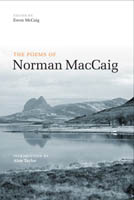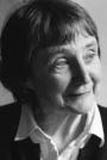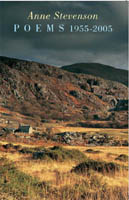Anne Stevenson
Two New Collections
It is always satisfying to see ‘definitive’ collections appear and to know that the work of one’s favourite poets, particularly some of their ‘disjecta membra’ – is made available between two covers. (That said, definitive editions will never deter literary sleuths in years hence from seeking – and discovering – an unpublished poem or two and revealing their finds to the world in the pages of the TLS; nor is it the prime intention of definitive editions to put paid to such devoted and dogged sleuths.)
But instead of making one rejoice, both of these massive collections are a little disappointing in their own way, though only in the approach each takes to collating and displaying their wares. As physical  works, neither is entirely satisfying. Edited by the poet’s son Ewen and with an introduction by Alan Taylor, The Poems of Norman MacCaig, though offered as the definitive edition, is a far cry from complete; and the Anne Stevenson collection, Poems 1955-2005, is, in its organisation, to say the least, very quirky.
works, neither is entirely satisfying. Edited by the poet’s son Ewen and with an introduction by Alan Taylor, The Poems of Norman MacCaig, though offered as the definitive edition, is a far cry from complete; and the Anne Stevenson collection, Poems 1955-2005, is, in its organisation, to say the least, very quirky.
These objections aside, in the meantime and faute de mieux, these editions will just have to do. After all, what matters is the poetry. And where Stevenson and MacCaig are concerned, their poetry matters greatly.
One would imagine that when a prestigious Scottish publisher had the opportunity to publish the collected poems of one of Scotland’s most accomplished and important twentieth-century poets, such an edition representing a landmark in Scottish publishing history, it would hope at the very least to be allowed to bring together the complete oeuvre of that poet. This in the name of completeness and authoritativeness: for the benefit of the common reader, students, and critics; and for dear old posterity. After however the publication of two Collected Poems, both of which appeared during MacCaig’s lifetime, and almost ten years after his passing, there is still not a complete, authoritative, definitive edition of his work. This 2005 collection, while aiming to be definitive, includes only a ‘cautious’ selection of previously unpublished works. And this simply will not do.
Perfectly ready to accept MacCaig’s particular objections to his early work, indeed MacCaig came to reject his first two publications out of hand, Far Cry (1943) and The Inward Eye (1946), disavowing them publicly to the extent of excluding them from both editions of his Collected Poems, and now that MacCaig is ‘at where extremes meet’, I nevertheless believe that his passing has changed everything. (And from what I recall, there is no clause in MacCaig’s will that absolutely forbids posthumous publication of his life’s work in its entirety.)
MacCaig’s early poems he dismissed as ‘intolerable rubbish’, ‘his middle-age juvenilia’ and ‘a vomitorium of unconnected images’ which he had ‘poured out with great jubilation and no pain.’ MacCaig’s early writing, his neo-Apocalyptic outpourings full of strange and forceful imagery first came to view in The White Horseman, a collection of poems by the New Apocalypse poets which had been published in 1941. And to exclude the work from MacCaig’s first two collections denies us the richness of these writings, the exuberance of his metaphors, and that early voice that is unmistakably MacCaig. It is a ‘revisionism’ of the worst kind; it is unscholarly; it is unhelpful. Besides, the poems in these first two publications were, after all, important enough to MacCaig to have offered to a publisher and they were of sufficient interest and merit to Routledge to have published. History – if not the reader – ought to be the judge and posterity does deserve better. Please give us these early poems – and whatever else remains – and let us judge for ourselves.
Of course, MacCaig had a long life and a long and productive writing career, publishing over a period of more than fifty years almost twenty volumes of poetry. And while it is true that only a poet’s best work matters, in the complete editions of, for example, Wordwsorth and MacDiarmid, there can be found (some) poems that are uninspired and equally uninspiring; verse that might pass for mere doggerel; and occasionally some works that are almost entirely unreadable. Yet, such ‘less successful’ poems appear between the covers of these complete editions alongside the highest achievements of these poets, and by virtue of coming from their pens these lesser works qualify for inclusion. This, I think, ought to be the case and no-one really needs shielded from any poet’s less successful poems by an over- protective editor. Didn’t Homer also occasionally nod? But those who know MacCaig’s work know that in every poem he conjured white rabbits from hats, and that in the creation of every poem he turned up aces, time after time after time. To make a complete and definitive edition, far from damaging or diminishing MacCaig’s reputation one jot, would show to the world the full extent of his genius. The Poems of Norman MacCaig is accompanied by a CD of selected readings he gave between the years 1967 and 1994.
 The Anne Stevenson Poems 1955-2005 is a remaking of her earlier Collected Poems with the welcome addition of new works. Bloodaxe is to be congratulated for bringing together these poems made over the last fifty years. But what jars a little at first is the anti-chronological approach to the presentation of the poems – you will not find your favourite poem where you would imagine it to be, normally alongside the others it appeared with when it was first published in a single volume. Rather, here the poems appear in ‘new thematic arrangements emphasising the craft, coherence and architecture of Anne Stevenson’s life’s work.’ Arranged in eight sections, seven of them newly-named and one untitled, knowing the titles of previous volumes does not help and the reader is kept on their toes. Perhaps this is what Ezra Pound meant by his war-cry, ‘make it new.’ The approach needed to locate familiar poems bielded in unfamiliar stells certainly is refreshing and this is perhaps not to be frowned upon. One does come to the poems afresh, as it were, having had to look for them with care (and having been surprised on the way there by other poems wanting to be read.)
The Anne Stevenson Poems 1955-2005 is a remaking of her earlier Collected Poems with the welcome addition of new works. Bloodaxe is to be congratulated for bringing together these poems made over the last fifty years. But what jars a little at first is the anti-chronological approach to the presentation of the poems – you will not find your favourite poem where you would imagine it to be, normally alongside the others it appeared with when it was first published in a single volume. Rather, here the poems appear in ‘new thematic arrangements emphasising the craft, coherence and architecture of Anne Stevenson’s life’s work.’ Arranged in eight sections, seven of them newly-named and one untitled, knowing the titles of previous volumes does not help and the reader is kept on their toes. Perhaps this is what Ezra Pound meant by his war-cry, ‘make it new.’ The approach needed to locate familiar poems bielded in unfamiliar stells certainly is refreshing and this is perhaps not to be frowned upon. One does come to the poems afresh, as it were, having had to look for them with care (and having been surprised on the way there by other poems wanting to be read.)
 Having found the poems sought, it is a pleasure to read them anew. One of the great delights of this collected poems is to rediscover Stevenson’s own regard for fellow-poets, in the number of poems she has written for other writers, for example: Edward Lowbury, John Heath-Stubbs, Philip Hobsbaum, Alasdair Gray and Penelope Shuttle. Stevenson’s In Memoriam section includes a fine poem i.m. Norman MacCaig, ‘A Parable for Norman’, in which she gives him a visit from, ‘Three vast unavoidable ladies,/Time, Fate and Boredom,/Come knocking at your door.’ The trio do their best to discomfit MacCaig, but he sees them all off, remembering that they have an other, and a better, sister, named Peace.
Having found the poems sought, it is a pleasure to read them anew. One of the great delights of this collected poems is to rediscover Stevenson’s own regard for fellow-poets, in the number of poems she has written for other writers, for example: Edward Lowbury, John Heath-Stubbs, Philip Hobsbaum, Alasdair Gray and Penelope Shuttle. Stevenson’s In Memoriam section includes a fine poem i.m. Norman MacCaig, ‘A Parable for Norman’, in which she gives him a visit from, ‘Three vast unavoidable ladies,/Time, Fate and Boredom,/Come knocking at your door.’ The trio do their best to discomfit MacCaig, but he sees them all off, remembering that they have an other, and a better, sister, named Peace.
The Collected Poems of Norman MacCaig. Polygon. ISBN 1-90459- 826-9. £25.
Anne Stevenson. Poems 1955-2005. Bloodaxe Books. ISBN 1-85224-699-5. £12.
© Michael Lister 2005

Comments